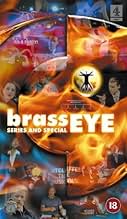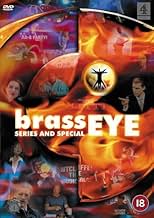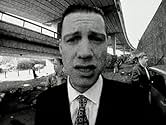Paródia polêmica da televisão atual e o papel das celebridades no Reino Unido.Paródia polêmica da televisão atual e o papel das celebridades no Reino Unido.Paródia polêmica da televisão atual e o papel das celebridades no Reino Unido.
- Indicado para 2 prêmios BAFTA
- 3 indicações no total
Explorar episódios
Resumo
Reviewers say 'Brass Eye' is a groundbreaking media satire that critiques sensationalism and media intelligence. It is noted for its uncomfortable, angry tone and clever use of graphics and music. The series lampoons trash media sensationalism on various subjects, trapping celebrities and politicians. It is considered a powerful assault on 90's media, remaining relevant and often compared to 'The Day Today'. Its subversive nature, controversial content, and ability to provoke thought make it a must-watch for fans of dark, satirical humor.
Avaliações em destaque
Any show which brasses off the editor of 'The News Of The World' is OK by me. The furore that surrounded the notorious 'paedophilia' special has ensured that 'Brass Eye' will not easily be forgotten. What was amusing was the way Rebekah Wade missed the point; it was not 'sending up' paedophilia', you can't do that, but rather the lynch-mob mentality of publicity-seeking tabloid rags. The rest of 'Brass Eye' was great too; particularly 'Drugs'. When Noel Edmonds uttered the phrase 'Shatner's Bassoom', I nearly died laughing. Top marks to Chris Morris for managing to trap so many D-list celebrities and charlatan politicians into making utter fools of themselves. As with 'The Day Today', the use of graphics and music is both clever and imaginative; an image of Peter Stringfellow was mocked in the 'Sex' episode. If 'Brass Eye' still shocks nearly a decade later, it is a testament to the genius of its creator. And it proved that the success of 'The Day Today' was not all down to Steve Coogan.
I've just become a fan of Brass Eye after seeing the DVD at a friends house, I have to say it is brilliant and there is no doubt in my mind as to why so many people were against the show. Brass eye shows how the media manipulates and exploits situations to tell you the viewer just what to think about everything. It is a satire on Panarama type shows where all the facts are laid out straight for everyone to see, that way everyone can agree that something is wrong, let's say "drugs" for example. The most controversial, maybe the funniest episode is the episode on Paedophelia. If only people realised that not only do the media promote and fuel paedophelia (just look through the papers, counting down the days that Mary Kate and Ashley became legal, Britney Spears first video, definite exploitation of Paedophelia). The media also speaks out against it, in around 2001 they used the subject spread hatred and fear, everyone was a suspected Paedophile. This is where I believe the humour lies in the show, it is not making fun of the serious issues but it is making fun of the way the Media uses these issues and will exploit them to their own advantage. A very clever and a very funny satire.
In these brightly Orwellian days, where cynical governments can smile 'Trust me...' and know we will fill in the blanks 'I'm lying' and not care; where 'biting' satire is left in the sole hands of a cricket-loving impressionist; where the laurel of 'great comedy' is placed on the head of yet another formulaic spoof of fly-in-the-wall documentaries; in these grimly shining times, Chris Morris is a dark beacon of sense, moral fury, fierce intelligence, intransigent vision; a man of endless, astonishing invention, intimidating energy and a gleefully, pranksterish sensibility.
The problem with today's 'satire' is that it sets up an 'us against them' opposition, in which we snicker with the satirist at a host of immovable, indifferent caricatures. Most of our most prominent satirists are of the same generation, background and ideology of the ruling classes, and their humour has the flavour of locker-room ribbing rather than devastating anger. Most satire consists of an audience talking to itself, reassuring itself of its own worth, its own values against targets so clearly ridiculous they don't really exist. It is satire as easy listening, as reassuring as old socks.
The reason many people don't like Chris Morris is not because of the 'taboo' subject matter he tackles, but because he doesn't play fair, he doesn't play cricket. He never allows the audience the comfort of complacent complicity. if we sneer at another hapless celebrity duped into piously anguishing over some preposterous non-issue in an obscene public gesture of their own ethical value and depth, we are stating that we are truly 'authentic', that we would never be caught out, that our values are sound. And then Morris will insert a crass joke that strips away the warm cloak of lazy irony - an imitation of the author of 'A Brief History of Time', for instance - that repels us, shakes us out of a cosy 'us vs them' mentality, forcing us to face up to the complexity of what we're watching, or - shock, horror! - think for ourselves.
When I was watching the 'Brass eye' repeats recently, I was struck by how little they had dated, how exhilirating and intellectually stimulating, as well as cripplingly funny, they still were. Surely a media satire, with its inbuilt topicality, should become instantly anachronistic. You could argue that this is a damning indictment of a media that hasn't changed its mind-numbing habits in the last half-decade. I would argue, however, that 'Brass eye' is not really a media satire at all, or is not one fundamentally, despite its destructively accurate potshots at sensationalism, the paucity of media intelligence, a culture with a media that no longer records or reflects reality, but actually creates it, as in the recent case of a major Sunday newspaper printing photos of paedophiles, encouraging the public to savage them, conveniently creating the next morning's news. This is all an essential part of what 'Brass eye' does.
But it is more than that. Morris is our century's Jonathan Swift, and last week's 'Brass eye special' on media hysteria about paedophilia was his 'A Modest Proposal', a satire so savage, so angry, so uncomfortable, so ironic in the true, original sense of that phrase, that people mistook the satire for its object, because Morris held up a mirror to our society, a totalitarian, propaganda-corrupt culture posing as a democracy; and to ourselves, we who conceal brutal, fascist instincts under a guise of ethical concern. We didn't like it, and rather than acknowledge our own darkness, we tried to smash the mirror. Like Swift, Morris has always been more concerned with language and ontology than the media per se, the way words no longer mean what they are supposed to mean, in the way the advance of media technology has created an illusionistic world in which 'real' people have to live, in which we try to make the illusion real, to devastating results. And yet, again like Irishman, the sheer invention with which Morris records this communicative decadence channelled through language, liberates and gives some hope - but only if we accept the challenge of 'Brass eye'.
The problem with today's 'satire' is that it sets up an 'us against them' opposition, in which we snicker with the satirist at a host of immovable, indifferent caricatures. Most of our most prominent satirists are of the same generation, background and ideology of the ruling classes, and their humour has the flavour of locker-room ribbing rather than devastating anger. Most satire consists of an audience talking to itself, reassuring itself of its own worth, its own values against targets so clearly ridiculous they don't really exist. It is satire as easy listening, as reassuring as old socks.
The reason many people don't like Chris Morris is not because of the 'taboo' subject matter he tackles, but because he doesn't play fair, he doesn't play cricket. He never allows the audience the comfort of complacent complicity. if we sneer at another hapless celebrity duped into piously anguishing over some preposterous non-issue in an obscene public gesture of their own ethical value and depth, we are stating that we are truly 'authentic', that we would never be caught out, that our values are sound. And then Morris will insert a crass joke that strips away the warm cloak of lazy irony - an imitation of the author of 'A Brief History of Time', for instance - that repels us, shakes us out of a cosy 'us vs them' mentality, forcing us to face up to the complexity of what we're watching, or - shock, horror! - think for ourselves.
When I was watching the 'Brass eye' repeats recently, I was struck by how little they had dated, how exhilirating and intellectually stimulating, as well as cripplingly funny, they still were. Surely a media satire, with its inbuilt topicality, should become instantly anachronistic. You could argue that this is a damning indictment of a media that hasn't changed its mind-numbing habits in the last half-decade. I would argue, however, that 'Brass eye' is not really a media satire at all, or is not one fundamentally, despite its destructively accurate potshots at sensationalism, the paucity of media intelligence, a culture with a media that no longer records or reflects reality, but actually creates it, as in the recent case of a major Sunday newspaper printing photos of paedophiles, encouraging the public to savage them, conveniently creating the next morning's news. This is all an essential part of what 'Brass eye' does.
But it is more than that. Morris is our century's Jonathan Swift, and last week's 'Brass eye special' on media hysteria about paedophilia was his 'A Modest Proposal', a satire so savage, so angry, so uncomfortable, so ironic in the true, original sense of that phrase, that people mistook the satire for its object, because Morris held up a mirror to our society, a totalitarian, propaganda-corrupt culture posing as a democracy; and to ourselves, we who conceal brutal, fascist instincts under a guise of ethical concern. We didn't like it, and rather than acknowledge our own darkness, we tried to smash the mirror. Like Swift, Morris has always been more concerned with language and ontology than the media per se, the way words no longer mean what they are supposed to mean, in the way the advance of media technology has created an illusionistic world in which 'real' people have to live, in which we try to make the illusion real, to devastating results. And yet, again like Irishman, the sheer invention with which Morris records this communicative decadence channelled through language, liberates and gives some hope - but only if we accept the challenge of 'Brass eye'.
There is actually very little point in writing this- it will never be repeated on British television as it offended too many of the moronic b-list celebrities who unwittingly contributed it; it is unlikely that American TV will show it, as even HBO would probably baulk at the content; it is almost definite that it will never be released on video. Yet, to the lucky few who actually saw it- as opposed to the hysteria that followed its only broadcast- it remains the greatest satire of the 1990s, perhaps of the television age.
Chris Morris is merciless in his humour- an abused girl is asked if her attacker was as good-looking as he is; in completely convincing fake American news extracts, we are told of menaces to American society such as the increase of priests with guns, and of the forgotten fourth man of the Apollo 11 mission whose role was that of sexual slave to the other three. Celebrities are fooled into supporting all kinds of ridiculous causes- Jilly Cooper and Alexandra Paul support an elephant in a German zoo which has stuck its trunk in its anus in a fit of depression; Stephen Berkoff warns us of the perils of 'heavy electricity' falling out of wires; and, controversially, several celebrities and Members of Parliament speak out against the fictitious drug 'Cake'- questions were even raised in Parliament, which led to the postponement of the original showing.
Many have found this programme grossly offensive, yet the conclusion is obvious- either celebrities are stupid, or they will jump on any bandwagon to promote themselves. The boldness too- Morris is a man who will take a hidden camera and ask real drug dealers for non-existent drugs whilst wearing only a nappy (diaper)and a beach ball.
Chris Morris is God.
Chris Morris is merciless in his humour- an abused girl is asked if her attacker was as good-looking as he is; in completely convincing fake American news extracts, we are told of menaces to American society such as the increase of priests with guns, and of the forgotten fourth man of the Apollo 11 mission whose role was that of sexual slave to the other three. Celebrities are fooled into supporting all kinds of ridiculous causes- Jilly Cooper and Alexandra Paul support an elephant in a German zoo which has stuck its trunk in its anus in a fit of depression; Stephen Berkoff warns us of the perils of 'heavy electricity' falling out of wires; and, controversially, several celebrities and Members of Parliament speak out against the fictitious drug 'Cake'- questions were even raised in Parliament, which led to the postponement of the original showing.
Many have found this programme grossly offensive, yet the conclusion is obvious- either celebrities are stupid, or they will jump on any bandwagon to promote themselves. The boldness too- Morris is a man who will take a hidden camera and ask real drug dealers for non-existent drugs whilst wearing only a nappy (diaper)and a beach ball.
Chris Morris is God.
More Jokes, One Liners, Insanity, Nonsense, Scathing Insight, Mockery, Satire, Offence, and Total Wrongness wrapped up in a Bitesize of 30 minutes than anything that has ever been previously created in the history of time and space.
Pushing the boundaries of Televisual Entertainment above and Beyond anything anyone would ever have expected. They actually had a question raised in Parliament about "Cake"! The endless stream of "Celebs" quoting ridiculous statements about the abuse of "Cake".
Probably my favourite part of this show is the visual graphic and statistics they employ. Wonderful!
Pushing the boundaries of Televisual Entertainment above and Beyond anything anyone would ever have expected. They actually had a question raised in Parliament about "Cake"! The endless stream of "Celebs" quoting ridiculous statements about the abuse of "Cake".
Probably my favourite part of this show is the visual graphic and statistics they employ. Wonderful!
Você sabia?
- CuriosidadesThe Paedogeddon Special is the third most complained-about episode of television ever (first and second are the Jerry Springer Opera and Big Brother 2000).
- Citações
Christopher Morris: You're wrong, and you're a grotesquely ugly freak!
- Versões alternativasWhen the show first aired in 1997, some of the more controversial sketches were cut on the orders of the then-head of Channel 4 programming Michael Grade, most notably a piece concerning a musical based on the life of and starring the serial killer Peter Sutcliffe. The edition of the show in which the sketch would have featured was allegedly broadcast containing a onscreen subliminal message lasting 1/25 of a second that read "Grade is a cunt". The series was repeated in 2001 with the Sutcliffe sketch and some other material shown uncut, and with the subliminal message removed.
- ConexõesFeatured in Storm Over 4 (1998)
Principais escolhas
Faça login para avaliar e ver a lista de recomendações personalizadas
- How many seasons does Brass Eye have?Fornecido pela Alexa
Detalhes
Contribua para esta página
Sugerir uma alteração ou adicionar conteúdo ausente

































